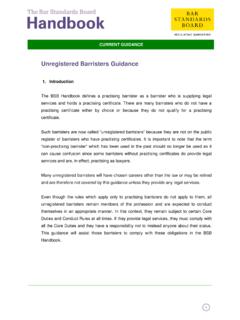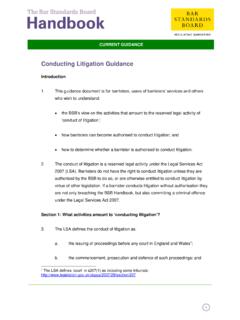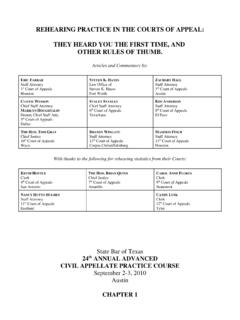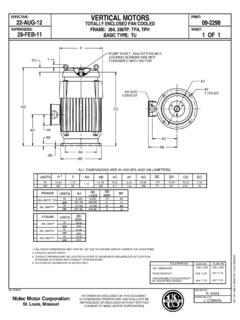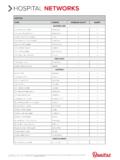Transcription of Continuing Professional Development (CPD) …
1 Continuing Professional Development (CPD) Guidance for barristers 2 Introduction 1. This guidance explains the Bar Standards Board s (BSB) new Continuing Professional Development (CPD) regime for barristers on the Established Practitioners Programme (EPP). The guidance is designed to provide practical support to help you complete your requirements. It has been designed with the assistance of barristers from a range of seniority levels and practice areas. 2. This guidance should be considered as supplementary to the provisions in the BSB Handbook Part 4 [at rules rQ130 rQ138 and guidance gQ1-gQ5, the text of which will be added to the Handbook with effect from 1 January 2017 and which you will find as an Annex to this Guidance for convenience]. You are required to have regard to this guidance when complying with the CPD rules.
2 Where it refers to a rule, it describes an essential requirement. Otherwise it gives examples of good practice or suggests how you might meet the outcomes required by the rules. These illustrations are not mandatory, but if you choose to take a different approach, the BSB may ask you to demonstrate how you feel you have adequately achieved what is required by the rules. 3. The CPD regime for Established Practitioners will change with effect from 1 January 2017. From this date you should comply with the new CPD requirements. 4. The guidance will be reviewed during the operation of the new approach to CPD. You are encouraged to share your feedback with us. To do so, you should contact We are keen to ensure that the guidance is as helpful as possible and will update and refine it in the light of comments and suggestions received.
3 What about the New Practitioners Programme (NPP)? 5. The requirements for new barristers are not changing save for the fact that their CPD activities will no longer need to be accredited. NPP barristers will continue to follow the current CPD requirements. This means that those barristers in their first three years of practice will continue to follow the NPP which requires them to complete 45 hours of CPD including at least 9 hours of Advocacy Training and 3 hours of Ethics. The CPD definition 6. defines CPD. CPD is work undertaken over and above your normal commitments as a barrister. CPD is undertaken with a view to developing your skills, knowledge and Professional standards in areas relevant to your present or proposed area of practice. This is in order to keep yourself up to date and maintain the highest standards of Professional practice.
4 7. The definition of CPD has not changed from the previous one. However, the EPP requirements and assessment process have changed. 3 How has the EPP changed? Summary of changes There is no minimum number of hours that you need to complete. You now have individual responsibility for deciding what training you require. There is no longer a requirement to complete accredited hours. You have increased flexibility in the types of CPD activities that you can complete. We will assess whether you have planned and completed your CPD in a structured way. Assessments of CPD will be made with regard to what CPD has been completed in previous years. 8. The role of our supervision team in setting Corrective Action for non-compliance has been formalised. This means that the focus on the regulation of CPD will not be on disciplinary action but on ensuring that you comply with the CPD requirements.
5 We hope that this will be a more effective approach as well as being a more proportionate use of our resources. 9. We will monitor CPD by spot checking. The focus will be on barristers who are at higher risk of non-compliance with their CPD requirements, supplemented with a random sample of the profession. High risk will be established, amongst other things, with reference to a barrister s history of compliance. 10. Non-compliance will generally be dealt with in the first instance through supervisory action. This will include recommendations (referred to in this guidance as corrective action ) where you appear not to have met the requirements of the rules. 11. Referral to enforcement action will be reserved for persistent non-compliance or non-cooperation. 4 Why have these changes been made? 12. The BSB has a statutory obligation to give the public assurance that barristers are competent, up to date and maintain high standards of work.
6 Our regulatory framework for CPD is an important way in which we do that. We want the new scheme to be: Less prescriptive More flexible More suited to your actual training needs Less likely to result in irrelevant CPD activities being completed Less likely to result in disproportionate supervision and enforcement action being taken for non-compliance 13. In addition the new regime will ensure that the CPD requirements help you to maintain high standards of practice. We have done this by creating a more proportionate and targeted approach to CPD, focusing on the quality of what is to be achieved. This is a departure from the previous more prescriptive approach. 14. The new CPD scheme puts in place a structure that allows you to determine your own Professional Development requirements for the year more efficiently.
7 It also allows us to assess whether you have planned and completed your CPD in a structured way. 15. The change to CPD is in line with what is regarded as best practice for regulation of Professional services. It will provide greater assurance to the public that the profession is meeting their expectations, and that the regulator is fulfilling its obligations as well. Benefits of the new CPD Scheme There is no need to complete a minimum amount of CPD, nor any amount of accredited CPD. This could save you time and money as you do not need to attend courses just to complete 12 hours of CPD. There is no incentive to complete irrelevant CPD activities. The types of CPD available are more flexible. For example, there is no restriction on the amount of legal writing which can be completed. The scheme takes into account CPD completed in previous years.
8 This means CPD can be planned with anticipated workload in mind and varied with actual workload, and can be directly carried over between years. There is no longer an extension or waivers process. If your circumstances mean that less CPD needs to be completed due to, for example, maternity leave, ill health or another reason, then this only needs to be noted on your CPD plan. This means that the regulation is less bureaucratic and more responsive to changing circumstances. 5 As a result, the BSB will be able to spend more time focussing on High Risk barristers and those who are not engaging with the CPD process or not completing appropriate CPD The CPD cycle 16. rQ134 of the Handbook sets out the four stages an EPP barrister must complete to be compliant with their CPD requirements. Stage 1: REVIEW Planning; Stage 2: RECORD Recording and evidence; Stage 3: REFLECT Reflecting on your CPD activities; Stage 4: REPORT Declaring completion.
9 17. In the following section we provide a practical example of how you can meet the different stages in the planning, recording, reflection and declaring cycle for CPD. 18. REVIEW During the planning stage you should complete a plan of the CPD that you are going to undertake. It is a requirement that you do this by setting learning objectives (see pages 4-12 for more information; ) which should provide specific aims and outcomes of the CPD you plan to undertake. It is a requirement that you also provide examples of the types of CPD activities that you are proposing to undertake 19. RECORD During the recording and evidence phase you should complete CPD activities and keep a record of them. ( ; ) 20. REFLECT The reflection phase takes place once the CPD activities have been completed for the year. ( ) We do not specify a process for the reflection stage, but good practice reflection involves considering how you have implemented the learning from the activities you have done, reviewing your Development in the light of this and then considering what further CPD you need.
10 It could include noting: Which learning objectives you completed, and how the activities you completed met your learning objectives Which learning objectives you did not complete and the reasons why not, Which learning objectives you changed, What you need to complete in future years. 6 21. REPORT Finally you should make a formal declaration that you have completed your CPD requirements. ( ). This declaration is made as part of the Authorisation to Practise process at the end of the year in a similar manner to the old system, when you renew your Practising Certificate. 22. Your compliance with the CPD scheme will continue to be monitored and assessed by us via spot checking. However, our role in setting Corrective Action for non-compliance has been formalised. Referral to enforcement action will primarily be reserved for persistent non-compliance or non-cooperation.

